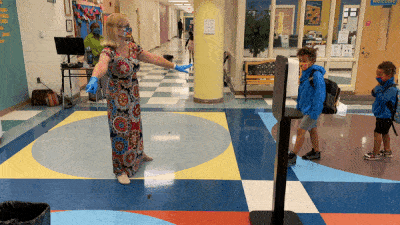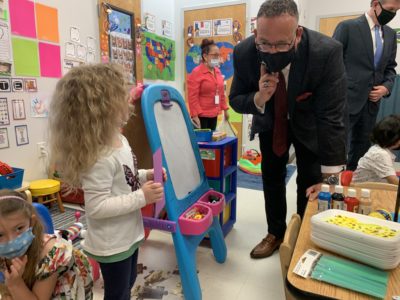School districts across North Carolina closed their doors to face-to-face instruction on March 16, 2020 due to the COVID-19 pandemic. This forced schools to educate students remotely for three months. With summer vacation included in the timeline, students were not in school for face-to-face learning for a total of at least five months.
According to years of research, students show a drop in performance between exiting school in the spring for summer break and re-entering school in the fall (Ctlreads, 2020; Kuhfeld, 2019; Kuhfeld & Tarasawa, 2020; Quinn & Polikoff, 2017). This summer learning loss is often referred to as the “summer slide.” This loss of learning can produce a gap between student groups that can increase over time.
Research indicates third grade reading proficiency is a predictor of high school graduation and future success (Casares, 2019; Casey, 2010; Casey, 2013; Children’s Reading Foundation, 2020; Ctlreads, 2020; Manning, 2020; Samuels, 2015; Weyer & Casares, 2019). Despite the fact there is extensive research done on summer slide (Ctlreads, 2020; Kuhfeld, 2019; Kuhfeld & Tarasawa, 2020; Quinn & Polikoff, 2017), there is currently little to no research on the impact of school closure on beginning-of-year (BOY) reading readiness due to a pandemic or how great this impact could be on student growth and achievement (Godsey, 2020; Schwartz, 2020; Von Hippel, 2020).
The purpose of this study was to determine, through a non-experimental quantitative study, if third grade students’ reading BOY readiness in a rural northeastern NC school district was negatively impacted due to school closure and if this impact is greater than the normal summer slide regression that occurs with no school closure.
The study compared third grade students BOY reading readiness in 2019 when there was no school closure to students entering third grade in 2020 following school closure to determine if there was a statistically significant difference in the third graders’ reading scores on the BOY i-Ready diagnostic test and the NC Beginning-of-Grade 3 (NC BOG3) state reading assessment.
The researcher’s study provided evidence that school closure did not significantly impact the third graders who experienced school closure in 2020-2021 due to COVID-19 compared to the third grade students who entered third grade the year prior in 2019-2020 and experienced no school closure beforehand. There was no statistically significant difference in the mean Lexile levels, i-Ready reading diagnostic scale scores, or NC BOG3 scale scores between the two groups of students in the study.
In addition, the study provided evidence that although there was no learning loss of the third grade students who experienced school closure prior to entering the third grade in 2020-2021, there was a statistically significant difference in the amount of growth that occurred from the BOY to the middle-of-year (MOY) on the i-Ready reading diagnostic compared to the growth that occurred on the same assessment in the same time frame for the students who did not experience school closure prior to entering the third-grade in 2019-2020.
Both groups showed statistically significant growth from BOY to MOY, but the difference of growth for the 2020-2021 students was twice the growth of the 2019-2020 students. Students entering the third grade in 2020-2021 and who had experienced school closure had a mean scale score that was 11.81 points lower on the BOY i-Ready reading diagnostic than the 2019-2020 students and an i-Ready reading diagnostic mean scale score that was 1.88 points higher on the MOY. This indicates the students who experienced school closure started behind, though not statistically significant, and surpassed the non-school closure students by MOY.
Findings of this study suggest school closure to face-to-face instruction did not impact the BOY reading readiness of third grade students in this rural northeastern North Carolina school district. Students who entered third grade following school closure were just as prepared as students who did not experience closure as evidenced by the study.
For the full dissertation, see below.
References
Casares, J. (2019). Third-grade reading legislation. National Conference of State Legislatures. https://www.ncsl.org/research/education/third-grade-reading-legislation.aspx
Casey, A. E. (2010). Reading by third grade. Early warning! Why reading at the end of third grade matters. Annie E. Casey Foundation. https://www.aecf.org/resources/early-warning-why-reading-by-the-end-of-third-grade-matters/
Casey, A. E. (2013). Early warning confirmed. Annie E. Casey Foundation. https://aecf.org/m/resourcedoc/AECF-EarlyWarningConfirmed-2013.pdf#page=3
Childress, G. (2020, August 10). NC may turn to low-performing virtual charters in response to demand for online education. NC Policy Watch. http://www.ncpolicywatch.com/2020/08/07/nc-may-turn-to-low-performing-virtual-charters-in-response-to-demand-for-online-education/
Ctlreads. (2020, June 25). Summer Slide 2020 could be the scariest in years. Charles Town Library. https://ctlibrary.org/2020/06/18/summer-slide-2020-could-be-the-scariest-in-years/
Godsey, M. (2020, July-August). Preparing for the COVID slide. Literacy Today, 38(1), 22–25.
Kuhfeld, M. (2019). Surprising new evidence on summer learning loss. Phi Delta Kappan, 101(1), 25–29. https://doi.org/10.1177/0031721719871560
Kuhfeld, M., & Tarasawa, B. (2020, April). The COVID-19 slide: What summer learning loss can tell us about the potential impact of school closures on student academic achievement. NWEA. https://www.nwea.org/research/publication/the-covid-19-slide-what-summer-learning-loss-can-tell-us-about-the-potential-impact-of-school-closures-on-student-academic-achievement/
Manning, H. E. (2020, October 1). Leandro judge says poor reading instruction, not money, is holding back many NC students. News and Observer. https://www.newsobserver.com/opinion/article246119320.html
Quinn, D. M., & Polikoff, M. (2017, September 14). Summer learning loss: What is it, and what can we do about it? https://www.brookings.edu/research/summer-learning-loss-what-is-it-and-what-can-we-do-about-it/
Samuels, C. A. (2019, February 21). Early grades crucial in path to reading proficiency. Education Week. https://www.edweek.org/ew/articles/2015/01/08/early-grades-crucial-in-path-to-reading.html
Schwartz, S. (2020, June 9). Early reading instruction takes a hit during COVID-19. Education Week. https://www.edweek.org/ew/articles/2020/06/01/early-reading-instruction-takes-a-hit-during.html
Von Hippel, P. T. (2020, July 17). How will the coronavirus crisis affect children’s learning? Unequally. Education Next. https://www.educationnext.org/how-will-coronavirus-crisis-affect-childrens-learning-unequally-covid-19/Weyer, M., & Casares, J. E. (2019). Pre-kindergarten-third grade literacy. NCSL. https://www.ncsl.org/research/education/pre-kindergarten-third-grade-literacy.aspx


